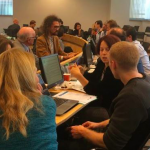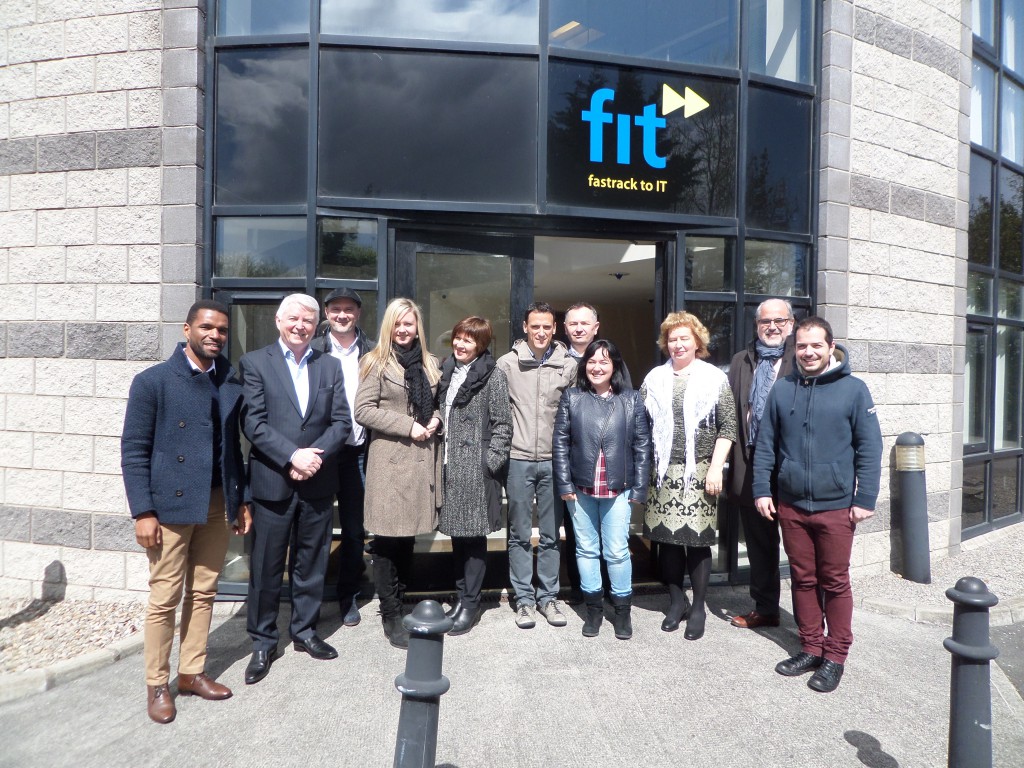19 Feb To solve the skills gap, involvement of employers is key
19 Feb, 2015
By Masha Tarle
The unemployment rate may be high but, unsurprisingly, employment opportunities demanding IT skills abound. The mismatch between the skills on offer and those in demand, also referred to as the ‘ skills-gap’ was tackled by the European Commission in 2013 when it called for organisations such as private companies but also non-profits and even governments to submit their pledges to address the skills gap.
New piloting project

The road between being employed and unemployed is a complex one. Digital skills now lead the way to employment
Fit4jobs project is a promising training-for-employment initiative centred on ICT skills. The project idea was started by Fast-track to IT (FIT Ltd), an Irish nonprofit organisation that has so far trained thousands of job seekers with IT skills demanded by employers locally. Due to their unique training model, a success rate of 75% (percentage of trainees that went on to find employment after completing the training) and the official recognition and funding they received from the European Commission, FIT Ltd strongly believes that their model is worth piloting in other EU countries. Six non-profit organisations and members of Telecentre Europe are currently implementing the ‘Fit4Jobs’ project in six EU countries affected by high unemployment, namely Greece, Spain, Portugal, Latvia, Lithuania and Ireland.
Is it the candidates or the employers?
Although the usual conversation in the area of unemployment and education is centred around the (un)preparedness of the job candidates and the relevance of their education or training, the premise of the Fit4Jobs piloting programme is that employers are the key to resolving the skills gap in their countries or regions. Employers have timely information of what IT skills they need in a candidate and they are well suited to provide advice and mentoring on soft skills such as team work and communication. As Fit4Jobs Project Manager Manus Hanratty says: “I consider this pilot to be an important project to highlight the importance of employer engagement more fully in the education process, as a means to better match industry skills needs with learning and education.”

Candidates will be offered a free training in advanced ICT skills and will be in continuous contact with potential employers
The first phase of Fit4Jobs consisted in ‘recruiting’ locally the private companies (in the IT sector mainly, but also in other sectors) that were interested in training their future employees and participating in the pilot. Following this phase, the partnering organisations in the five countries are now finalising the process of choosing the right candidates for the free trainings in advanced ICT skills. Priority is being given to those candidates that have low to mid-level IT skills, a high interest and motivation in the in the field and who have been long-term unemployed. The next phase will be to offer 30 candidates in each country a free training of 180 hours covering a three-month period. The content of the training courses and the exact IT skills to be delivered will depend on the country, with some countries choosing to focus on web development and others on applications and software development.
The project partner will document and report their observations and data through the whole process in order to get a deeper understanding of what are the opportunities and pitfalls of training for employment programmes in the five participating countries. The aim of the initiative is to have a high success rate of employment amongst the candidates in training and to set a precedent for more targeted and employer based training for employment programmes to come all over Europe.
If your organisation wants to organise Fit4Jobs pilot in your country, please contact Project Manager Manus Hanratty of FIT Ltd.
Partner organisations in FIT4Jobs project:
Latvia: Latvian Information and Communication Technology Association (LIKTA), the leading ICT professional non-governmental association promoting the development of Information Society and e-skills in Latvia.
Lithuania: The Lithuanian Association Langas I ateiti, a non-profit initiative launched in 2002 by private companies and that provides computer literacy and Internet training to adults stimulating the growth of e-services countrywide.
Spain: The Spanish Association of Telecentre Networks” (ACRT) brings together a number of entities to impulse, activate and maintain public spaces (telecentres) in order promote the Information Society and provide access to ICT to citizens.
Portugal: Programa Escolhas, a nationwide program, created in 2001 and operating under the High Commission for Migration, aiming to promote social inclusion of children and young people from vulnerable socio-economic backgrounds.
Greece: The Hellenic Professionals Informatics Society (HePIS) is a network of all ICT Professionals in Greece advocating their interests at both national and European level.
Ireland: FIT Ltd (Fast Track to IT) is an industry-led initiative which works in close collaboration with the (Irish) government departments and national education and training agencies, local development organisations and a host of community based organisations to provide IT training for employment to long-term unemployed people.
Telecentre Europe is a member-based association representing networks and NGO’s in the field of digital skills, social inclusion and ICT adult education providers. We represent telecentres, telecentre networks and any European organisation that provides access to and training in digital skills.








